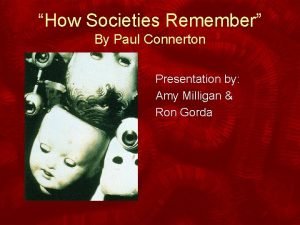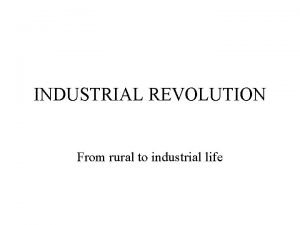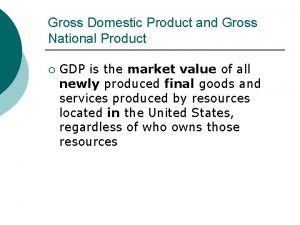Agricultural Societies Meguire Gross What is an Agricultural














- Slides: 14

Agricultural Societies Meguire Gross

What is an Agricultural Society? �Constructs social order upon the reliance of farming. �Also called Agrarian Society. �Settle in areas with a body of water. �Make their living from farming.

History �First developed in Southwest Asia �Took over hunter-gatherers �New technology made farming possible �Lead to cities and towns being formed

Products �Foods �Fibers �Raw materials � 1/3 of the worlds workers work in agriculture

Dawn of Civilization �The creation of this society led to the dawn of civilization with the creation of towns and cities and the expansion of music, poetry, and philosophy.

Gender Roles �On average women are: shorter, and weaker than men �Men were raised to be fighters, and fearless. �Men had the advantage of being able to hold larger weapons �As a result, the women's roles were not as large as the men’s. They would hunt small game and help the men

Why are they beneficial? �Agricultural societies were formed because new technologies made it possible. �Rotating crops �Metal tools �Fertilizer

In Our World Today �Much less common than they used to be. �Still exist in some rural parts of the country. �Some poorer countries still rely on agriculture to fuel their economy

Where Did They Go? �The industrial revolution took over the prevalence of agricultural societies. �Economy became based off of factories and farms became less common. �Still present in some parts of society

Where are they found today? �Unindustrialized Countries �Central American Countries �Urban areas

Institutionalization �Institutionalization is the act of implanting a convention or norm into society. �Agriculture became part of society in this way. �Became a norm for all.

Habitualization �“Any action that is repeated frequently becomes cast into a pattern, which can then be … performed again in the future in the same manner and with the same economical effort” (Berger and Luckmann 1966). �Society is a habit.

Aspect of Agricultural Societies �Social Classes �Social differences �Art and writing increased

References � Agricultural Society: Definition & Concept (n. d. ). In study. com. Retrieved April 21, 2016, from http: //study. com/academy/lesson/agricultural-society-definition-lesson-quiz. html � History of Agriculture (n. d. ). In New World Encyclopedia. Retrieved April 21, 2016, from http: //www. newworldencyclopedia. org/entry/History_of_agriculture � Harris, M. (n. d. ). Powerpoint. In public. iastate. edu. Retrieved April 21, 2016. � Keirns, Nathan J. , et. al. 2015. Introduction to Sociology 2 e. Houston, Texas. Open. Stax College. � Renfrew, C. (ed. ) 1993. The Explanation of Culture Change. Pittsburgh: University of Pittsburgh Press. � Pryor, F. L. 2006. "The Adoption of Agriculture: Some Theoretical and Empirical Evidence. " American Anthropologist 88: 879 -97. � Johnson, A. W. 2000. The Evolution of Human Societies: from Foraging Group to Agrarian State. Stanford: Stanford University Press
 Rumus gross benefit cost ratio (gross b/c)
Rumus gross benefit cost ratio (gross b/c) New england federation of humane societies
New england federation of humane societies African iron age
African iron age Feudalism developed as a way for medieval societies to
Feudalism developed as a way for medieval societies to Describe preindustrial societies of horticulturalists.
Describe preindustrial societies of horticulturalists. International chemical congress of pacific basin societies
International chemical congress of pacific basin societies Monotheism
Monotheism Effas certified esg analyst
Effas certified esg analyst Simple horticultural societies
Simple horticultural societies History helps us to understand these about people
History helps us to understand these about people Paul connerton how societies remember
Paul connerton how societies remember Advantages and disadvantages of building societies
Advantages and disadvantages of building societies Domestic system
Domestic system Types of society
Types of society North and central african societies
North and central african societies



























